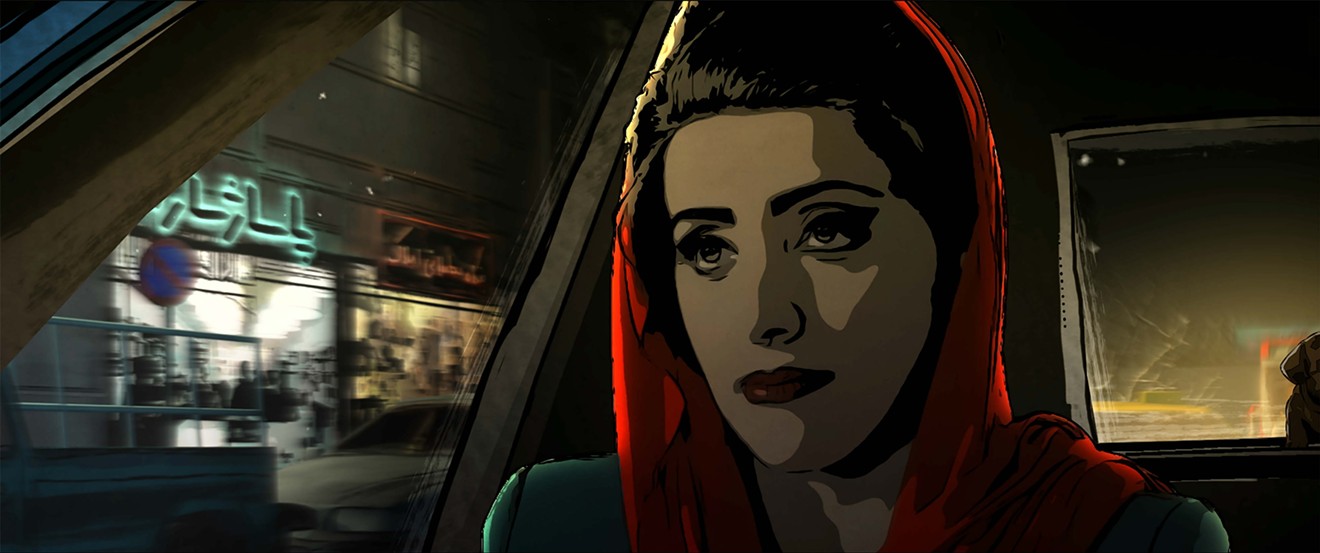There are many taboos explored in Ali Soozandeh’s animated Tehran Taboo, not the least of which is the taboo against filming movies in Tehran about things that are taboo in Tehran.
As such, Iranian-born Soozandeh shot his cast against a green screen in Germany — where he lives in exile, another barrier to location shooting — and rotoscoped them into an animated vision of the Iranian capital. As rotoscoped films go, the aesthetic result is thankfully closer to Richard Linklater’s Waking Life than Ralph Bakshi’s The Lord of the Rings, though like both, it has a dreamlike (and occasionally nightmarish) quality. Politically, it joins Jafar Panahi’s dashcam-shot Taxi as one of recent years’ great cinematic fuck-yous to the Iranian government.
The animated mise en scene also helps because Tehran Taboo would almost be too bleak had it been shot as a live-action film, exploring as it does the extreme sexual hypocrisies of the modern Islamic Republic of Iran — and, by extension, all conservative patriarchies.
Soozandeh wastes no time establishing both the hypocrisy of the devout in Iran (or America, or Gilead) and his Short Cuts-ian tapestry of characters: In the opening scene, prostitute Pari (Elmira Rafizadeh) goes down on a cabbie (Farhad Payar) after giving the money to her mute son Elias (Bilal Yasar) in the backseat. The driver unfortunately can’t get it up and, even more unfortunately, sees his daughter walking down the street holding a man’s hand. The driver becomes so overcome with rage at his daughter’s impropriety — again, while he is getting blown by a prostitute whose son is in the backseat — that he crashes the taxi.
Pari and Elias are fine, their deeper problem being that Pari’s husband is in jail, but she can’t divorce him and/or get a legal job without his written permission. An Islamic Revolutionary Court magistrate agrees to sign the papers provided she’ll become his concubine (remember: men are inherently moral, and women are wicked), moving her and Elias into a not-terrible apartment. There, she befriends the pregnant Sara (Zahra Amir Ebrahimi), who wants to get a job but is forbidden to by her banker husband Mohsen (Alireza Bayram). Meanwhile, Mohsen turns down the bank loan for musician Babak (Arash Marandi), who, after having sex with a woman named Donya (Negar Mona Alizadeh) in a nightclub, now must scrounge up the money and means for Donya to have her hymen restored before her upcoming marriage to a violent brute.
The quest to either sew up a hymen or purchase a passably fake one gets treated as just a normal thing that normal people do in a morally righteous country that — and this is going to sound cuckoo-bananas, but roll with me here — may not be quite as concerned with maintaining women’s morality as it is with protecting men’s frail egos.
But if the radio advertisements Babak works on are to be believed, you can at least get a decent hamburger in Tehran. So it has that going for it.
[
{
"name": "GPT - Billboard - Slot Inline - Content - Labeled - No Desktop",
"component": "16971022",
"insertPoint": "2",
"requiredCountToDisplay": "2"
},{
"name": "Editor Picks",
"component": "15769925",
"insertPoint": "4",
"requiredCountToDisplay": "1"
},{
"name": "Inline Links",
"component": "16575154",
"insertPoint": "8th",
"startingPoint": 8,
"requiredCountToDisplay": "7",
"maxInsertions": 25
},{
"name": "GPT - Rectangle 2x - Slot Auto-select - Labeled",
"component": "15782206",
"insertPoint": "8th",
"startingPoint": 8,
"requiredCountToDisplay": "7",
"maxInsertions": 25
},{
"name": "Inline Links",
"component": "16575154",
"insertPoint": "8th",
"startingPoint": 12,
"requiredCountToDisplay": "11",
"maxInsertions": 25
},{
"name": "GPT - Leaderboard to Tower - Slot Auto-select - Labeled",
"component": "15782207",
"insertPoint": "8th",
"startingPoint": 12,
"requiredCountToDisplay": "11",
"maxInsertions": 25
}
]











